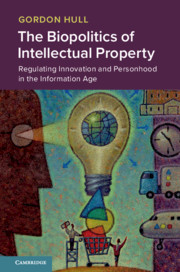Description
The Biopolitics of Intellectual Property
Regulating Innovation and Personhood in the Information Age
Author: Hull Gordon
Examines different ways of understanding power in copyright, trademark and patent policy.
Language: English
Subject for The Biopolitics of Intellectual Property:
Approximative price 43.23 €
In Print (Delivery period: 14 days).
Add to cart
The Biopolitics of Intellectual Property
Publication date: 01-2020
230 p. · 15.1x22.8 cm · Paperback
Publication date: 01-2020
230 p. · 15.1x22.8 cm · Paperback
Approximative price 120.27 €
In Print (Delivery period: 14 days).
Add to cart
The Biopolitics of Intellectual Property
Publication date: 01-2020
230 p. · 15.7x23.5 cm · Hardback
Publication date: 01-2020
230 p. · 15.7x23.5 cm · Hardback
Description
/li>Contents
/li>Biography
/li>
As a central part of the regulation of contemporary economies, intellectual property (IP) is central to all aspects of our lives. It matters for the works we create, the brands we identify and the medicines we consume. But if IP is power, what kind of power is it, and what does it do? Building on the work of Michel Foucault, Gordon Hull examines different ways of understanding power in copyright, trademark and patent policy: as law, as promotion of public welfare, and as promotion of neoliberal privatization. He argues that intellectual property policy is moving toward neoliberalism, even as that move is broadly contested in everything from resistance movements to Supreme Court decisions. This work should be read by anyone interested in understanding why the struggle to conceptualize IP matters.
1. Introduction; 2. Theorizing intellectual property; 3. Copyright; 4. Trademark; 5. Patents; 6. Conclusion: politics was already in the way; 7. Works Cited.
Gordon Hull is Associate Professor of Philosophy and Public Policy at the University of North Carolina, Charlotte. He has published numerous articles on contemporary philosophical and political theory, intellectual property, privacy, and the history of philosophy. He is also the author of Hobbes and the Making of Modern Political Thought (2009).
© 2024 LAVOISIER S.A.S.




